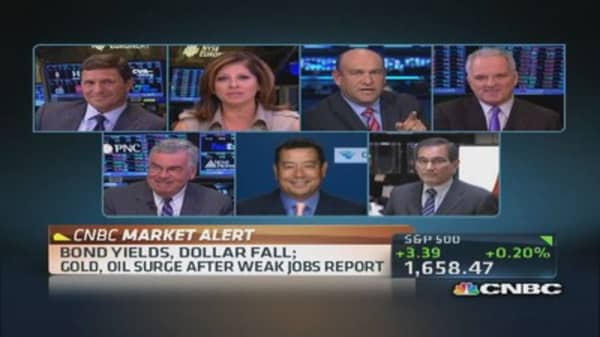There are number of factors including the following:
Technology
An increasing number of jobs have been eliminated because of the advance of technology. his not only includes software that allows companies to take phone calls via voice recognition but also robots that replace manufacturing personnel.
In a competitive environment, companies are looking to cut costs and technology allows them to do just that. Reducing costs means reducing employment.
(Read more: Here come Microsoft's new Surface tablets)
Global outsourcing
It is a well-documented fact that jobs have left the U.S. for lower paying locales. With the average wage in China around $2-3 dollars an hour for higher paying manufacturing positions, it's no wonder outsourcing is gaining traction.
While it's true that global outsourcing has slowed as wages have increased in emerging markets, there remains a massive differential between U.S. wages and emerging market costs.
CFO caution
Who can forget the credit freeze in 2008 when even companies like General Electric could not obtain working capital financing through commercial paper?
Companies are run by people, and CFOs remember clearly the cash crunch that impacted even the best companies during the financial crisis. For that reason, CFOs as well as CEOs are very cautious about spending cash and that means less hiring.
(Read more: Crisis cost up to $14 trillion, Dallas Fed says)
So given these 3 realities, what is an investor to do?
The U.S. economy will continue to recover but we should be cautious in our perspective about the slope of growth that will occur.
It's our view that GDP in the United States will be subpar for a significant period of time which will impact companies which cater to a consumption thesis. This is not to say that growth will not occur; it will.
But it is important to recognize that this expectation should be muted.
When making investment decisions, buy best-of-breed companies that have proven they can operate efficiently and creatively. Process engineering and cost cutting will be an important part of successful earnings management.
This has always been the case but in the future it will be an imperative and not optional if companies wish to maintain market share and grow profitability.
Look for companies that actually have a published strategy on how they are going to be effective in a leaner environment.
If a company tells you that they are going to operate in a normalized economy and their results will be completely dependent on economic recovery, run from this type of stock.
Don't buy followers and those that believe they can operate as they have in the past. These are the types of companies that will likely underperform and blame the environment for their woes.
Instead, look for thought leaders who recognize the future will not be like the past.
Look for companies whose leaders recognize that all is not well in the world and that changing environments require a more proactive plan to grow profits and build market share.
Look for leaders who see reality and operate based on this reality: Growth will be slower and a plan is needed to cope with this chronic condition.
—Michael Yoshikami is the CEO and founder of the investment committee of Destination Wealth Management.




